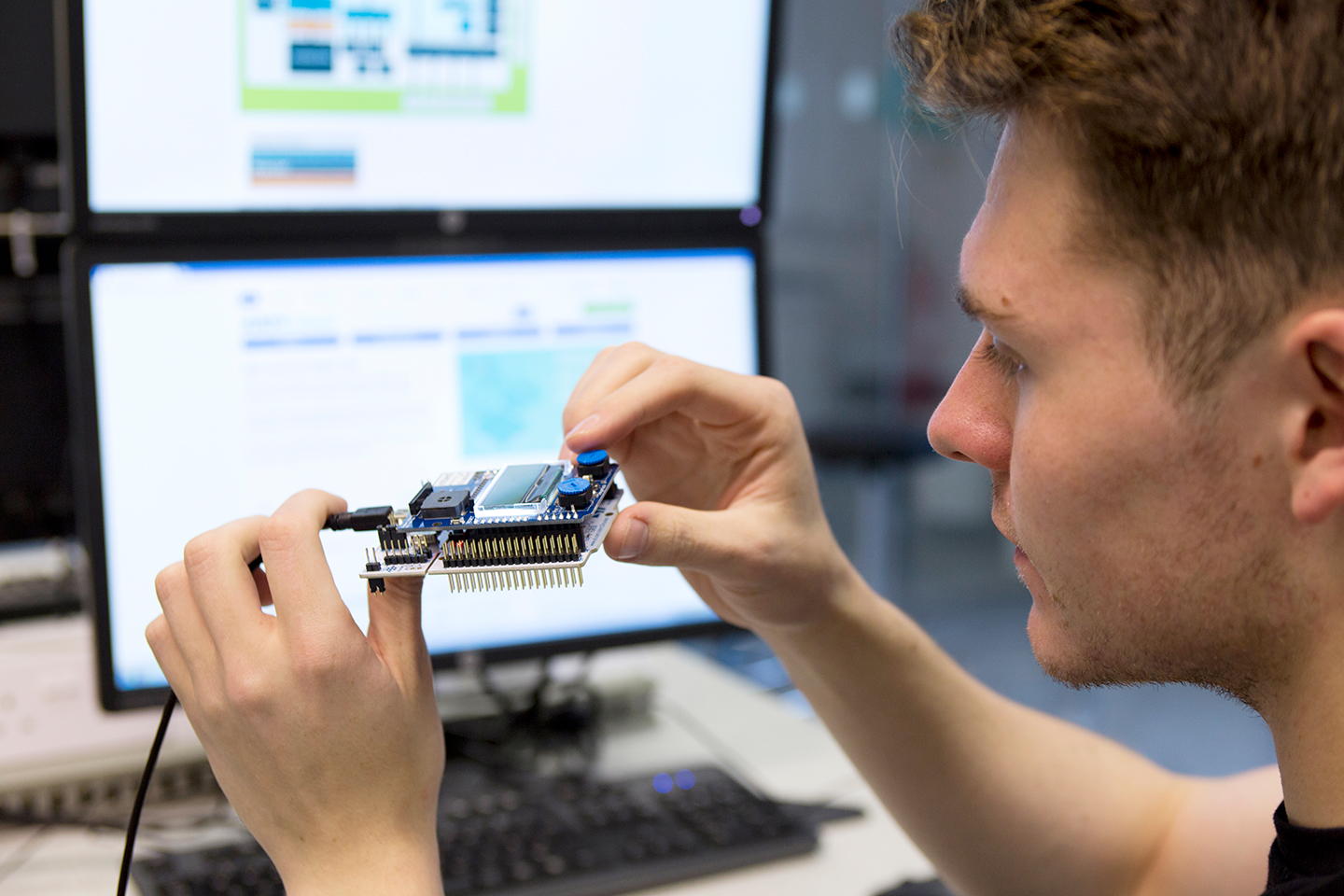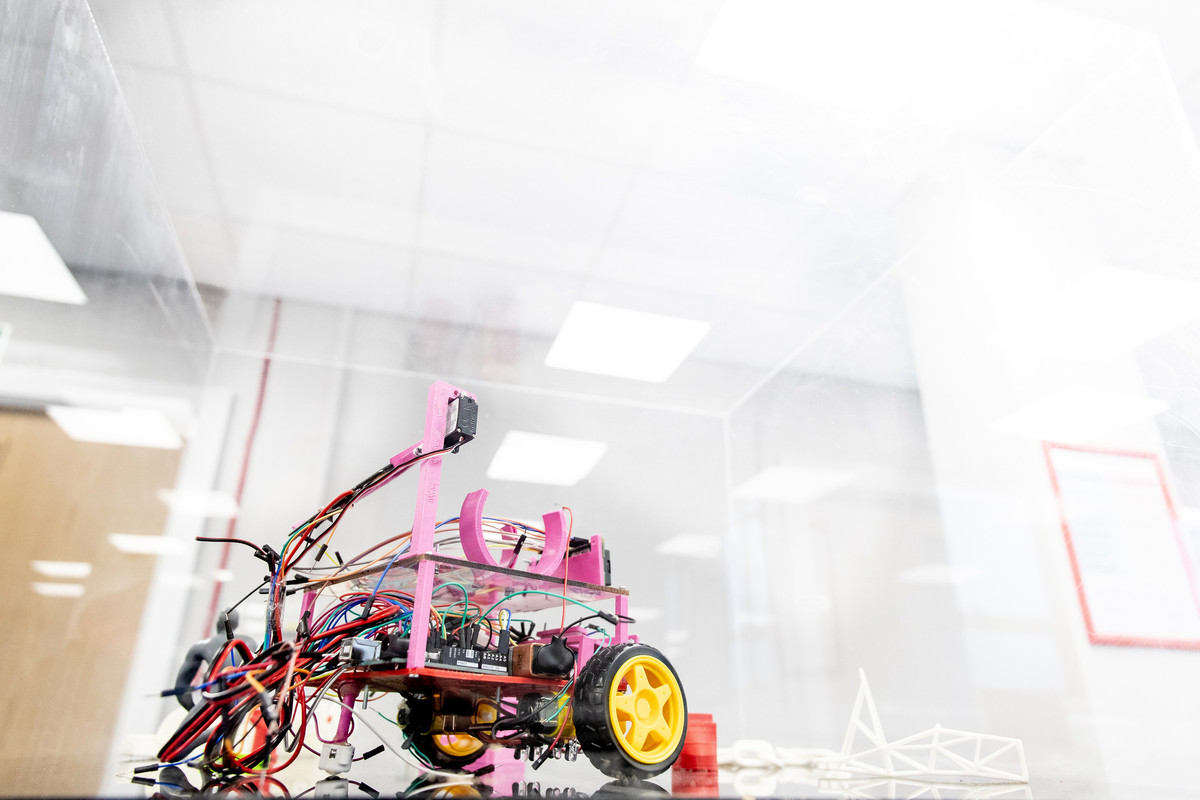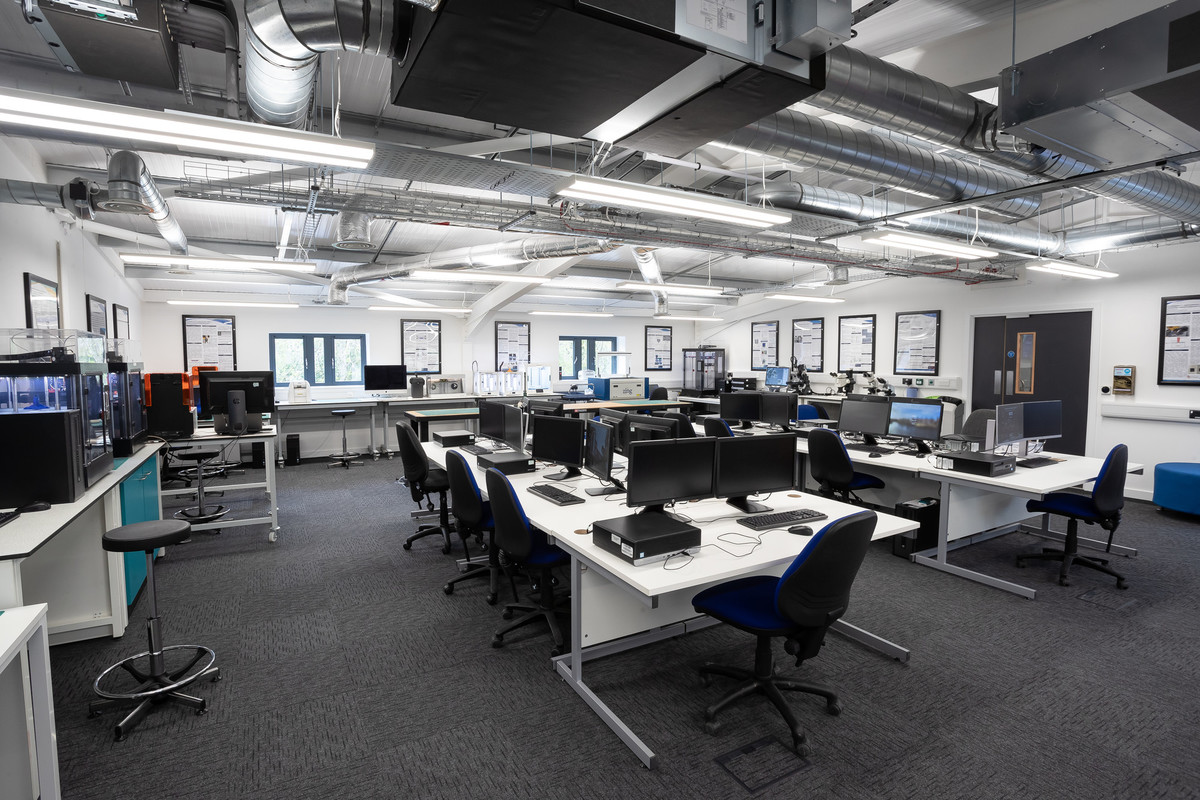Electronic and Electrical Engineering (with optional Placement/Project year) MSc

The rapid pace of technological change requires a broad educational background in order to be able to design, control and maintain smart electronic devices and IoT systems. This degree combines the core elements of electronic engineering, focusing on hardware components and software programming like sensors, embedded systems and robotics, with comprehensive exploration of AI and cyber security. This enables students to bridge the gap between hardware and software, gaining a holistic understanding of modern technology.
Smart devices have considerable influence on how we live our lives, from the pervasive mobile phone to the emerging driverless vehicles. Intelligent systems are enabled by the Internet of Things (IoT) paradigm, a key ingredient of this MSc, with multiple sensors feeding data over networks to be processed on the cloud.
Electronic and Electrical Engineering graduates are in high demand. We’re committed to helping you meet the challenge of gaining job-oriented skills by teaching simultaneously the underpinning theory and practical engineering applications.
Our strong local links with industry will provide you with substantial opportunities for practical work experience. The Electronic and Electrical Engineering team has rich research experience and collaborations with industries; many of our Master’s students carried out their research projects with companies such as Glen Dimplex, URENCO, BRE, Arup North West, Advanced Control, Spiro Control, Passion for Life Healthcare, GHD Environment, Arvia and RFIDdirect.
We have modern labs of embedded systems, control engineering, power electronics, electromagnetics, cybersecurity and robotics, where students are exposed to industrially-relevant software and hardware making them ready for employment.
There is an option to choose a Project/Placement year for this course, at an additional cost.
What You'll Study
You will learn the advanced theory and practical skills in embedded systems, robotics, Internet of Things, power electronics, control systems, cybersecurity techniques and AI computing. You will be taught research methods, equipping you with techniques on how to approach research and technology development.<br> If you choose a placement or project year, the Research Dissertation module will be replaced by a placement or project module.
Module content:
- Evolution of Robotics
- Microcontrollers: Arduino and Raspberry Pi
- Computer Vision
- Agents and Multi-Agent Systems
- Machine learning and robotics
Module aims:
- To introduce the concept of artificial intelligence (AI) and to evaluate its role in the development of robotics.
- To introduce theoretical approaches to the development of intelligent robots.
- To undertake practical tasks to demonstrate how AI techniques can be implemented for robotics.
- To analyse methods for designing and deploying robotic systems.
- To critically evaluate the ways in which intelligent robots can be used in real world situations
Module content:
- Speaking Cyber - Core understanding of Cybersecurity terminologies
- Introduction to programming with cybersecurity perspective
- Implementing secure systems. Illustrative of what may be covered include:
- Design and development considerations
- Selecting and applying core technologies
- Cryptography
- Human factors
- Auditing (security audits, logging, digital investigation
etc.) - Defense-in-depth
- Google hacking
- Pentesting
- Threats and resolutions
Module aims:
- To empower the students with core understanding of the key terminologies in cybersecurity
- To introduce students to programming with a cybersecurity perspective
- To provide students with the understanding of the common cybersecurity concepts and technical security controls available to prevent, detect and recover from security incidents and to mitigate risks
- To give students a solid foundation in the practical technical skills which can then be harnessed later in CO7604 and CO7605
Module content:
Control Systems Engineering and Design
1. System Network Diagrams and input/output port types and causality, Functional Analysis, Function Means Trees, Working Principles and the Feedback Servomechanism Principle in details. Impact of design constraints.
2. Introduction to functional design view of controllers with Tracking, Stabilisation and Prediction (TSP) approaches and the use of Relative Degree in Conceptual Controller Design.
3. Controller Design with Phase and Gain Compensation, Phase Advance, Notch Filtering and Digital filtering using z-transforms
Multi-input Multi-output
(MIMO) State-Space Controller Design Methods
4. Continuous-time MIMO State-space controller design using full and partial state feedback
5. Discrete-time MIMO State-space controller design using full and partial state feedback
6. MIMO Inverse Dynamics in Continuous and Discrete-Time
7. MIMO PI, Pseudo Derivative Feedback
(PDF) control and Robust Inverse Dynamics Estimation in state-space and role of integrator in inverse dynamics
8. MIMO functional TPS algorithms
Nonlinear systems.
9. Use of State-Space Design for Nonlinear Control e.g. Variable Structure Control
10. Nonlinear Inverse Dynamics
11. Stability of Nonlinear Inverse Dynamics using Small Perturbation Linearisation with State-Space Modelling.
Intelligent Control and Optimisation
12. Deterministic Methods to design and Tune MIMO linear and nonlinear control algorithms.
11.. Stability of Nonlinear Inverse Dynamics using Small Perturbation Linearization with State-Space Modelling.
13. Use of optimisation methods (e.g. Gradient based methods) and nonlinear system modelling and simulation to tune MIMO controllers
14. Introduction to Neural networks and their design for use in MIMO control systems for learning algorithms.
15. Introduction to Machine Learning
Module aims:
Intelligent Systems, Sensors and Control
The last decade has seen an upsurge in the development of intelligent modelling and control structures over their counterpart mathematical model-based structures due to their success in dealing with complex multivariable uncertain systems without the need for extensive dynamic modelling. The aim of this module is to introduce intelligent sensors, their interface into systems and the use of intelligent control.
Module content:
Power Conversion
- AC-DC power conversion: thyristor converters, rectification, inversion, HVDC and drive applications, harmonic analysis.
- DC-AC power conversion: inverter types, managing output waveform distortion; and application in drives, reactive-power compensation and power-flow control.
High-Power Semiconductor Devices
- Characteristics, performance and application requirements.
Machines and Drives
- Induction machines: operation as motors and generators; space harmonic effects, and dynamic model.
- Large synchronous machines; operating characteristics, dynamic model, and introduction to vector control.
Power System Protection
- The protection overlay: Protection and metering transducers. Fuses.
- Overcurrent protection: relay types, operating characteristics and equations, grading, applications.
- Differential protection: voltage balance and circulating current schemes, biased characteristics and high impedance schemes. Applications to the protection of transformers, feeders and busbars.
- Distance protection: basic principle, block average comparator, zones of protection, residual compensation, power swing blocking.
- Digital protection: relay hardware. Digital signal processing in protection relays. Digital distance protection. Digital differential protection.
Simulation
Practical workshops will be provided at the computer to design and simulate electrical systems, including the representation of components. Students will design, test and evaluate different electrical machines, methods of protection for specified applications.
Module aims:
The aim of this module is to introduce and analyse electrical machines and power electronic systems for medium to high -power applications; such as, industrial and traction drives, small-scale power generation, and power system control. To examine the operation, characteristics, and capabilities of commonly used systems and their control methods.
Module content:
Each student undertakes an individual project, at Masters level, in an area related to the MSc programme. The project area is chosen by the student at the beginning of the academic programme in consultation and agreement with potential supervisors. The project may be university-based or carried out in an engineering-related organisation. A key aspect of the MSc project is that it requires students to inform the project activities with critically-appraised new and emerging knowledge of the engineering discipline.
The project process would involve students employing advanced skill in problem definition, delineation of deliverables, project planning, systematic, comprehensive and critical review of literature, research methodology, robust analysis and discussion of results, generation of evidence-informed engineering solutions and conclusions.
The project would include consideration of the non-technical context of the problem such as environmental, economic and social sustainability impacts.
The engagement with project supervisor, enables student to develop in-depth understanding of the chosen area of the engineering discipline as well as acquire important skills of effective communication within a community of practice. The assessment of the MSc project enables the student to develop key skills on clear communication of complex technical information to specialist and non-specialist audience.
Module aims:
The individual project provides students with a learning experience to solve challenging engineering problems by employing critically-appraised current, new and emerging knowledge.
It affords students the opportunity to demonstrate to peers and to current and potential employers the student’s ability to develop innovative engineering solutions informed by good quality academic research, in a particular field, relevant to engineering. This may involve the application of existing research within a novel context.
Module content:
Embedded Systems and Field Programmable Gate Array (FPGA) Technology
- Concurrent assignment statements and unintended memory
- Adopting proper hardware description language (HDL) coding style and taking a divide and conquer approach for code development
- The need for design simplification.
- Regular sequential circuit block system and registers
- Building test-benches for sequential circuits
- Timing, clocking, operating frequency and clock tree considerations
- The Finite-state machine (FSM), its representation and FSM HDL code development
- The Finite-state machine with data path (FSMD), its representation and FSM HDL code development
Internet of Things (IoT)
- Automatic Identification Technology and Radio-frequency identification (RFID)
- Wireless Sensor Network
- Location System
- Internet and Mobile Internet
- Wireless Access Technology
- Big Data, IoT & Cloud Computing
- Information Security for IoT
- IoT Application Case Studies
- Arduino Opla, Espressif System on Chip (SoC) & Raspberry Pi IoT technologies
Module aims:
The Embedded Systems part of this module aims to develop the skill in students of digital systems design with the VHDL hardware description language (HDL) and Field Programmable Gate Array (FPGA) reprogrammable and fast prototyping technologies. Students will be able to produce design, synthesis of circuits and implement system on chip (SoC) using modern electronic design automation (EDA) tools.
The Internet of Things (IoT) contents aim to develop the advanced practical skills in building and designing IoT related components and network systems, going from the sensors layer to the cloud processing. This part also develops expertise in the use of a hardware/software tools to create and simulate practical systems, considering big data, energy consumption control and network security aspects.
Module content:
This L7 module is specially designed for the MSc programme with due consideration to the fact that most students may not have a sufficient computing background from their undergraduate study. The course is structured in such a way that all the essential pre-requisites shall be covered on an ‘learn-when-you-need’ basis.
The overall module will be roughly divided into the following sub-modules: Background (including the mathematical foundations); Contemporary AI applications on Scalar Data (e.g. cybersecurity, financial predictions, financial fraud detection,
etc.); AI for Multimedia applications (e.g. activity detection in CCTV videos, video summarisation,
etc); and Ethical and Legal Considerations.
The AI applications considered in the module would cover a broad range, including engineering, biology, finance, and society, with use-cases drawn from contemporary application scenarios. Open-source dataset(s) will be used for the purpose of training and testing the machine learning models.
Module aims:
The introduction of this module stems from the realisation that while AI skills are in demand in almost all employment sectors, many engineering graduates do not have sufficient skills to leverage AI in real-life applications. This module therefore assumes no prior knowledge of machine learning theory and/or implementations. On the completion of this module, the students should be able to design and implement effective and efficient AI models for a wide variety of applications scenarios. Lastly, the course will also empower the students to take informed actions/decisions while applying AI for their intended use-case in due consideration of the legal and ethical issues that may be involved.

How we teach at the University of Chester
Teaching
You will learn through a combination of lectures, seminars and hardware/software laboratory sessions at Exton Park’s purpose-built facilities. The School has state-of-the-art hardware laboratories for control systems, embedded systems, Internet of Things and power electronics. PC suites running a plethora of electrical and electronic engineering software applications for device, circuit and system simulation are also available.
Industrial-oriented projects will also be possible with input from an industrial supervisor, as well as the academic supervisor.
Assessment
You will be assessed via coursework assignments and written reports. The modules are assessed typically through two or three separate coursework assignments with a varied final mark weighting, for example 50%/50%, or 25%/75%, or 40%/10%/50%.
You will be guided by an experienced academic supervisor with specialist knowledge in an area of interest to you for your individual project.
Your Future Career
Job Prospects
Graduates of this degree will be in demand by a broad spectrum of electronic, electrical, information technology and engineering organisations, particularly those within the industrial, automotive, aerospace and consumer electronics sectors.
Careers service
The University has an award-winning Careers and Employability service which provides a variety of employability-enhancing experiences; through the curriculum, through employer contact, tailored group sessions, individual information, advice and guidance.
Careers and Employability aims to deliver a service which is inclusive, impartial, welcoming, informed and tailored to your personal goals and aspirations, to enable you to develop as an individual and contribute to the business and community in which you will live and work.
We are here to help you plan your future, make the most of your time at University and to enhance your employability. We provide access to part-time jobs, extra-curricular employability-enhancing workshops and offer practical one-to-one help with career planning, including help with CVs, applications and mock interviews. We also deliver group sessions on career planning within each course and we have a wide range of extensive information covering graduate jobs and postgraduate study.
Beyond the Classroom
For the MSc Project module, there will be opportunities for students to do collaborative projects with technology-based companies that are high-tech companies in the North West of England. You will be able apply what you have learnt to real scenarios in the workplace, giving you genuine experience and insight that will prepare you for your future career.
Entry Requirements
2:2 honours degree
A minimum of a 2:2 honours Bachelor of Engineering (BEng) or BSc degree in either:
- Electronic and Electrical Engineering
- Electronic Engineering
- Electrical Engineering
- Control Engineering
- Communications/Information Engineering
Applicants with a minimum of a 2:2 honours in a related area, such as Computing, Physics or Mechatronics will also be considered.
Applicants whose first language is not English must provide evidence of proficiency to IELTS 6.5 with no less than 5.5 in each band or equivalent.
2:2 honours degree
A BEng honours degree in Electronic and Electrical Engineering, Electronic Engineering, Electrical Engineering, Control Engineering or Communications Engineering or a related area are suitable for this MSc degree, with a minimum of a 2:2 classification.
English Language Requirements
For more information on our English Language requirements, please visit International Entry Requirements.
Optional 2-year Master's To Suit Your Needs
Choosing a Professional Placement MSc is a win-win for your career, giving you the chance to get real experience, apply your cutting-edge skills in the workplace and stand out to future employers.
In the first year you will have help from the University to find a placement, whilst developing your expertise. You will then spend your second year out in industry on placement, getting the chance to work with industry professionals and grow your network of industry contacts. Bringing your university-acquired knowledge and insights to industry, you will get to make a difference to the workplace and make lasting links with your employer.
Students need to find and secure their own placement, supported by the University. A preparation module will also help you to get ready for your placement.
Please note, this course is available as a one-year master degree course, or as a Two-Year Master's Course with a Professional Placement or Project. Please carefully consider your options when applying for our one year or Two-year routes as successful international applicants will not be able to change between courses after a Confirmation of Acceptance of Studies (CAS) letter has been issued or after arriving in the UK.
Fees and Funding
£9,990for the full course (2026/27)
Guides to the fees for students who wish to commence postgraduate courses are available to view on our Postgraduate Taught Programmes Fees page. Here you will also find information about part-time fees and project/placement year fees.
£15,500for a full-time course (2026/27)
The tuition fees for international students studying Postgraduate programmes in 2026/27 are £15,500.
Please note: For MSc programmes where a placement or project year is undertaken there will be an additional charge of £2,900 for the placement/project year (due at the start of the second year of the course).
The University of Chester offers generous international and merit-based scholarships for postgraduate study, providing a significant reduction to the published headline tuition fee. You will automatically be considered for these scholarships when your application is reviewed, and any award given will be stated on your offer letter.
For more information, go to our International Fees, Scholarship and Finance section.
Irish Nationals living in the UK or ROI are treated as Home students for Tuition Fee Purposes.
Your course will involve additional costs not covered by your tuition fees. This may include books, printing, photocopying, educational stationery and related materials, specialist clothing, travel to placements, optional field trips and software. Compulsory field trips are covered by your tuition fees.
The University of Chester supports fair access for students who may need additional support through a range of bursaries and scholarships.
Full details, as well as terms and conditions for all bursaries and scholarships can be found on the Fees and Finance section of our website.







